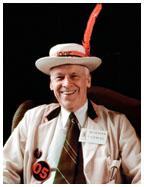Thomas, who was my grandfather, had a sense of humor. He railed against human folly, but he understood it and forgave it. When my father, Evan Thomas ’42, dropped out of Princeton in the fall of 1941 to go to war driving an ambulance with the American Field Service attached to the British Eighth Army, my grandfather wrote him: “If the Lord must be disappointed in us men and our ways, so must be the Devil in the face of such courage, love, and companionship as plain people show.”
Thomas ran for president of the United States six times (1928–1948), but never won more than 800,000 votes. It amused him to recall that Franklin Roosevelt once invited him into the Oval Office and told him, “You know, Norman, I think I’m a better politician than you are.” My grandfather would grin when he told that story and say, “I thought that was a damned obvious thing to say.” Thomas’ 1932 platform — minimum-wage laws, low-cost housing for the poor, a five-day workweek, unemployment insurance, health insurance for the aged, civil rights for blacks, and old-age pensions — doesn’t look so radical now. He was an early and strong anti-communist (Leon Trotsky said, “Norman Thomas called himself a Socialist as the result of a misunderstanding”), and he disapproved of the militancy of radicals in the late 1960s. He disliked seeing young people burning the American flag. “Wash the flag,” he said. “Don’t burn it.”
My grandfather — “Big Dad,” he was called by his family — was in some ways conventionally upper-middle class. In the evenings, he liked to go swimming at the Cold Spring Harbor Beach Club. As a boy, I recall seeing him lying on his back, paddling along as he debated the world’s fate with another beach club member, John Foster Dulles 1908.
Thomas was a brave man. He stood up against petty tyrants. In March 1935, notes William Manchester in The Glory and the Dream, Thomas went to Mississippi to speak out for black sharecroppers and to castigate the racist rule of Gov. Theodore (“The Man”) Bilbo. A drunken mob beat him bloody and threw him across the county line. “We don’t need no goddamn Yankee bastard to tell us what to do with our niggers,” someone said. Three years later, my grandfather spoke out against Mayor Frank (“I Am the Law”) Hague in Jersey City. Police slugged him and escorted him out of town; he came right back. There is a famous Life magazine photo of Thomas, who was an ordained Presbyterian minister, turning his cheek as an egg splatters against his head. A policeman on a horse rears in the background.Thomas loved Princeton. The son of a Presbyterian minister from Marion, Ohio, he was introduced to the world of ideas at Princeton and graduated first in his class. He faithfully came back to Old Nassau for P-rades. At Reunions, he once dryly remarked, “I prayed to God to make me a sophomore again for just one night. And he did.” Though Thomas wanted to die crusading for justice, and he toured the world into his 80s, the stroke that left him bedridden occurred as he was listening to the 1967 Princeton-Harvard football game; he was stricken when Princeton held on fourth-and-one to preserve an 18–14 upset victory against an undefeated Harvard team.
In Café Vivian at the Frist Campus Center, there is a photo of Thomas at his 60th reunion in his Class of 1905 beer jacket. When Thomas returned to Princeton for that reunion, he was half-blind and hobbled by arthritis. He made his way to the Princeton-Yale baseball game on the arm of his classmate Ray Fosdick. A cheer from the crowd went up as they entered the stands. “What’s going on, Ray?” Thomas asked. “I can’t see. Why are they cheering?” Fosdick turned to his friend and said, “Why, Norm, don’t you understand? They’re cheering for you.”
Evan Thomas, editor-at-large at Newsweek, is in his first year of a five-year campus appointment as the first Ferris Visiting Professor of Journalism in Residence.

